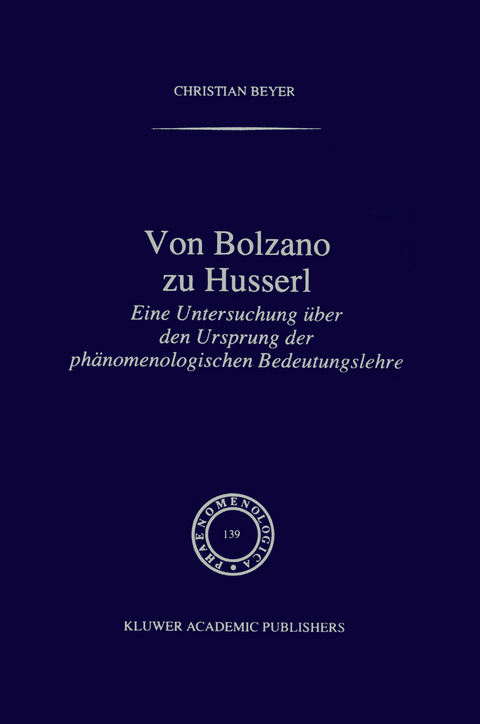
Von Bolzano zu Husserl
Eine Untersuchung über den Ursprung der phänomenologischen Bedeutungslehre
Seiten
1996
Springer (Verlag)
978-0-7923-4050-8 (ISBN)
Springer (Verlag)
978-0-7923-4050-8 (ISBN)
This text studies the historical and systematical origin of Edmund Husserl's views on meaning as manifested in his influential work, "Logical Investigations" (1900-01) and "Ideas" (1913), relating them both to the theories of Bernard Bolzano and Hermann Lotze.
This text contains a detailed study of the historical and systematical origin of Edmund Husserl's views on meaning as manifested in his influential work, "Logical Investigations" (1900-01) and "Ideas" (1913), relating them both to Bernard Bolzano's theory of the relationship between logical experiences and their objective contents (from his 1837 "Theory of Science") and to Hermann Lotze's theory of ideas (from his 1874 "Logic"). The author clarifies the basic concepts of Husserl's theory of meaning and shows that it is Platonic (rather than Aristotelian) in spirit. Furthermore, he defends an "identificationalistic" interpretation of Husserl's central notion of "noematic X" and outlines a Husserlian contribution to the "externalism/internalism" debate in recent analytic philosophy. The book is aimed at philosophers of language, mind and logic with either a phenomenological or an analytic background, Husserl scholars, and historians of 19th- and 20th-century philosophy.
This text contains a detailed study of the historical and systematical origin of Edmund Husserl's views on meaning as manifested in his influential work, "Logical Investigations" (1900-01) and "Ideas" (1913), relating them both to Bernard Bolzano's theory of the relationship between logical experiences and their objective contents (from his 1837 "Theory of Science") and to Hermann Lotze's theory of ideas (from his 1874 "Logic"). The author clarifies the basic concepts of Husserl's theory of meaning and shows that it is Platonic (rather than Aristotelian) in spirit. Furthermore, he defends an "identificationalistic" interpretation of Husserl's central notion of "noematic X" and outlines a Husserlian contribution to the "externalism/internalism" debate in recent analytic philosophy. The book is aimed at philosophers of language, mind and logic with either a phenomenological or an analytic background, Husserl scholars, and historians of 19th- and 20th-century philosophy.
Erstes Kapitel. Die Phänomenologie der logischen Erlebnisse.- 1.0 Einleitung.- 1.1. Die drei thematischen Dimensionen der reinen Logik.- 1.2. Erkenntnis und Logik (Searle, Husserl).- Zweites Kapitel. Bolzano pur: Die wesentlichen Unterscheidungen.- 2.0 Einleitung.- 2.1 Vorbegriffe.- 2.2 Subjektive Vorstellung und Vorstellungsstoff.- 2.3 Urteil und Urteilsstoff.- Drittes Kapitel. Bolzano, Lotze, Husserl: Die Spezies-Konzeption der Bedeutung.- 3.1 Lotzes Ideenlehre.- 3.2 Husserls Spezies-Konzeption der Bedeutung.- 3.3 Ausblick: Indexikalität und noematisches X.- Literatur.
| Reihe/Serie | Phaenomenologica ; 139 |
|---|---|
| Zusatzinfo | V, 210 S. |
| Verlagsort | Dordrecht |
| Sprache | deutsch |
| Maße | 155 x 235 mm |
| Themenwelt | Geisteswissenschaften ► Philosophie ► Geschichte der Philosophie |
| Geisteswissenschaften ► Philosophie ► Philosophie der Neuzeit | |
| Geisteswissenschaften ► Philosophie ► Sprachphilosophie | |
| ISBN-10 | 0-7923-4050-7 / 0792340507 |
| ISBN-13 | 978-0-7923-4050-8 / 9780792340508 |
| Zustand | Neuware |
| Haben Sie eine Frage zum Produkt? |
Mehr entdecken
aus dem Bereich
aus dem Bereich
die kolonialen Wurzeln der französischen Theorie
Buch | Hardcover (2024)
Matthes & Seitz Berlin (Verlag)
28,00 €
oder Das Leben Montaignes in einer Frage und zwanzig Antworten
Buch | Softcover (2023)
C.H.Beck (Verlag)
18,00 €


